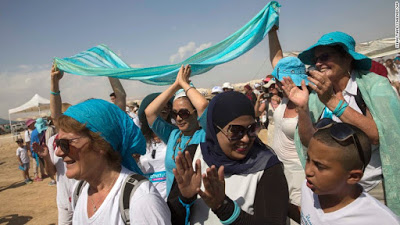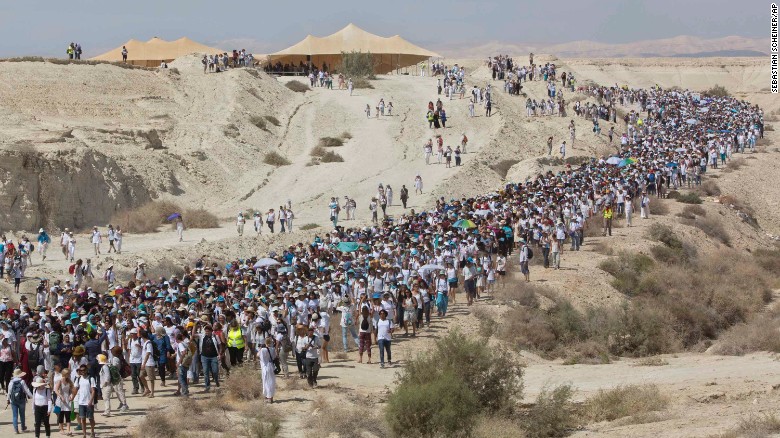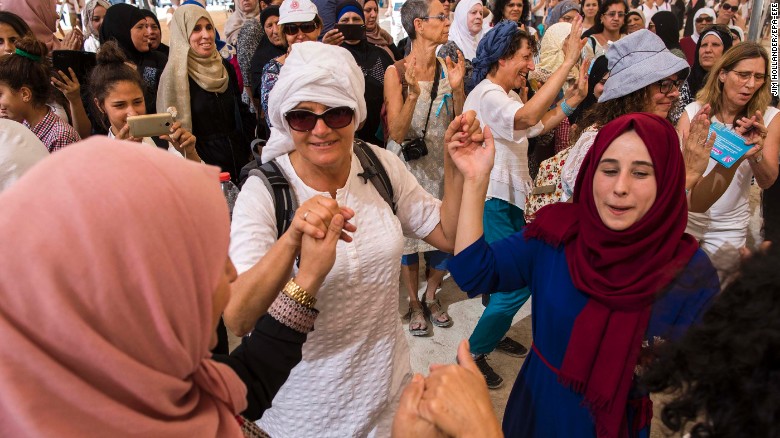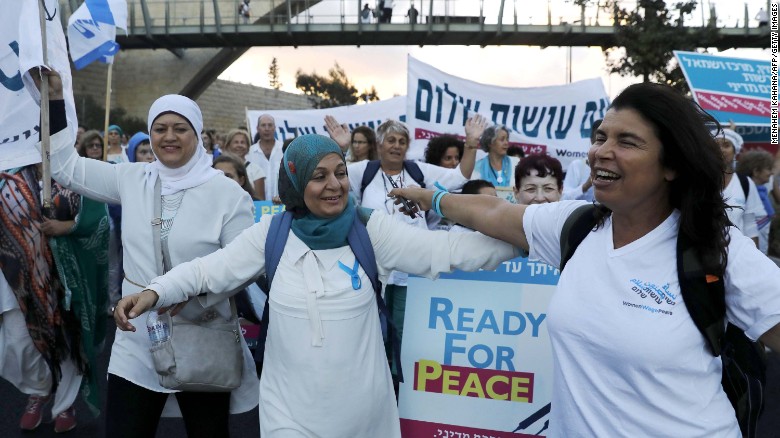Israeli, Palestinian women join peace march through desert
 |
| Oren Liebermann – October 9, 2017 |
Under a white tent on the shores of the Dead Sea, Huda Abuarquob’s frustration melted away. Dancing arm-in-arm with thousands of Israeli and Palestinian women, she felt hope surround her.
The women, who came together Sunday morning in the “Peace Tent,” had marched through the desert to the lowest point on earth, to demand an end to the Israeli-Palestinian conflict. Many were dressed in white as a symbol of peace.
The march was the culmination of two weeks of events, attended by more than 30,000 women, throughout Israel and the West Bank, organized by Women Wage Peace, a grassroots organization calling for a “bilaterally acceptable political agreement.”

Thousands of women gathered to demand that their leaders work towards a peace agreement.
After watching political leaders on both sides of the intractable conflict fail to bring peace, Abuarquob, a Palestinian from the West Bank city of Hebron, felt it was time for women to make their mark “because women matter, because women are inclusive, because women gave so much trust to the leaders here and the leaders failed us.”
The last round of negotiations, led by then-U.S. Secretary of State John Kerry, fell apart in April 2014, with the two sides blaming each other. A few months later, Israel and Gaza were at war.
Women Wage Peace was founded in the aftermath of the Gaza war, when organizers felt there was a need for a different approach. Organizers want to build public support for a political agreement while exerting pressure on decision-makers.
“Something happened in 2014,” said Yael Triedel, an Israeli who participated in the march. “The recognition that this is it. We have to do it. No one else is going to do it for us. The leaders didn’t manage to do it so far, and it’s our responsibility to make it happen.”

Israeli and Palestinian women dance together under a large tent during the mass protest.
On Sunday evening, tens of thousands of women gathered in Jerusalem’s Independence Park for the conclusion of the peace march.
Former Knesset member Shakib Shanan, whose son was one of two border police officers killed near Jerusalem’s holiest site in mid-July, spoke at the park. “We are allowed to say this out loud — we are lovers of peace.
“In the name of this huge crowd here and hundreds of thousands of Israeli citizens, I call on [Palestinian Authority President Mahmoud] Abbas and [Israeli Prime Minister Benjamin] Netanyahu, ‘Enough already! Sit together! Sit together! We want peace! Listen to our cry, it comes from our hearts.'”

Palestinian and Israeli activists march in the heart of Jerusalem demanding a Mideast peace deal.
The closest Abbas and Netanyahu have come to each other in recent years was a simple handshake at the funeral of Israeli President Shimon Peres last September.
Yet Abuarquob sees a reason to be optimistic.
“There is a need for success somewhere in the world, and I do believe that the American administration has that interest in making the Israeli-Palestinian conflict a success story,” said Abuarquob. “It’s an effort that I’m seeing closely from Jason Greenblatt and the American Consulate here in Jerusalem to push forward the peace process with firm instructions from the administration.”


